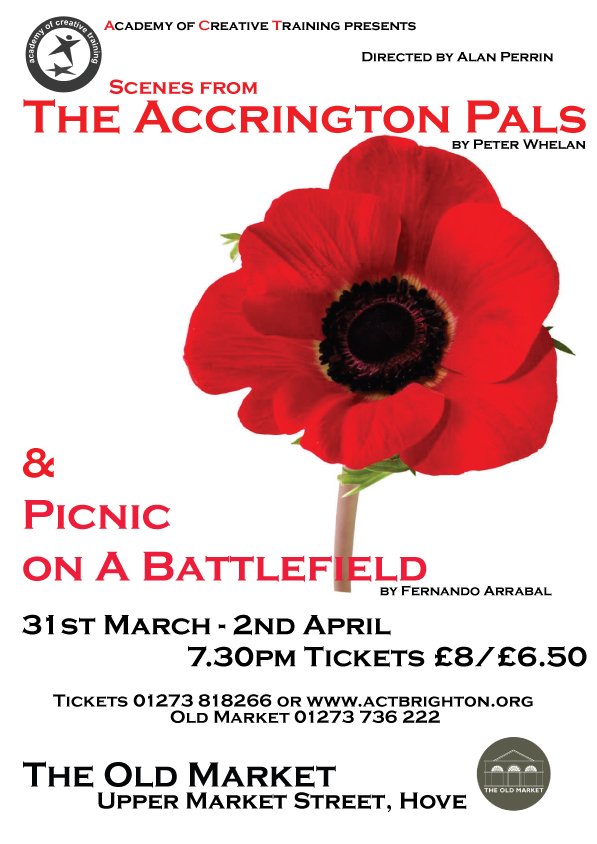CAST
The Accrington Pals
May, a stallholder ... Louise Taylor
Tom, an apprentice ... Stephen Forrest
Ralph, a clerk ... Karl Williams
Eva, a mill girl ... Tegen Hitchens
Sarah, a mill worker ... Sarah Preston
Bertha, a mill girl ... Annie Tayler
Annie, a housewife ... Tamar Karpas
Arthur, her husband ... Ian Draper
Reggie, her son ... Ellen Capron
Lighting Design & Operation Gabriel Philips-Sanchez
Sound Design & Operation Ben Kidd
Picnic On A Battlefield
Zapo ... George Ravenscroft
Monsieur Tepan ... Ian Draper
Madame Tepan ... Julia Asling
Zepo ... Karl Williams
Stretcher Bearer 1 ... Annie Tayler
Stretcher Bearer 2 ... Ellen Capron
Lighting Design & Operation Gabriel Philips-Sanchez
Sound Design Matthew Bonham
Sound Operation Ben Kidd
Directed by Alan Perrin
Two Year Diploma 2008-2010
A Double Bill:
Scenes from THE ACCRINGTON PALS by Peter Whelan
PICNIC ON A BATTLEFIELD by Fernando Arrabal
The Old Market, Hove.
31st March - 2nd April 2010
Directed by Alan Perrin
"Those who cannot remember the past are condemned to repeat it." George Santayana
THE ACCRINGTON PALS, first performed by the RSC in 1981, is a play that allows us to enter the minds of the common people who lost so much during the Great War - soldiers who enlisted, in innocence and ignorance, to fight for their country and the women left behind to grieve their loss. Whelan pits the idealistic socialism of the artist, Tom, with the individualism of May's self-help philosophy. The play, inspired by the real tragedy of The Accrington Pals, is based on actual events around the Battle of the Somme and explores how the propaganda machine shaped public opinion.
This absorbing play contrasts The Pals' experiences in the trenches with those of the women at home, adapting to new patterns of life and drawing together in the face of social and sexual deprivation. At times funny, at times sad, the play paints a moving and powerful picture of the changes in civilian life during wartime.
PICNIC ON A BATTLEFIELD, written in 1958, is set during a battle. During a lull in the fighting at the front, soldier Zapo gets a surprise visit from his parents who have decided to cheer him up with a picnic. While bombs burst around them, the family makes a madcap picnic, joined by an enemy whom their son has captured. A series of comic situations highlights the family's impossible encounter with the Other. The play ends on a merry note with the slaughter of all concerned.
Arrabal describes his plays as 'dramatised nightmares...direct manifestations of my inner world as revealed through my dreams.... The dream is my starting point'. Through experiencing this 'Picnic', we see the ultimate absurdity of war, that war erodes our morals and leads caring,compassionate citizens, who in peacetime would not harm anyone, to consent to and support the annihilation of people and property in wartime. Arrabal shows us that understanding breeds fellowship and community, fellowship and community breed reverence and respect and reverence and respect metamorphose battlefields into picnics.
An effective exploration of the meaning of war
By Stephanie Jones-Berry
The Argus - Saturday 3rd April 2010
As Britain nears the end of a decade dogged by unpopular military action. Families at war serves to dwell on the timeless, naive hubris of the battlefield and the absurd propaganda machine that accompanies it. Scenes from peter Whelan's The Accrington Pals - the first in a double meditation on war at Hove's Old Market - told the story of the 1,100 unwitting Lancashire men who signed up to Kitchener's call for volunteers during the First World War.
ACT drama students, directed by Alan Perrin, offered the audience a touching and humorous exploration of the ultimate decimation of a whole community and its failing trust in the higher authorities. The devastating loss suffered at the Battle Of The Somme was realised through the lives of the woman waiting at home and the slow dawning that "truth" is an elusive commodity. Some effective performances particularly by the actresses of the piece - Sarah Preston and Ellen Capron in comic relief - underpinned the overall stern message.
Less well known is the Fernando Arrabal play, Picnic On A Battlefield, which enjoyed an outing in the second half. A madcap picnic took place as two bemused and unpatriotic soldiers from opposing sides, Zepo and Zapo, were visited by Zapo's parents on the battlefield. Ultimately ending in tragedy, this stark and simple piece of theatre was an amusing comment on the absurdity of war and questions who is actually fighting, and for what?
Throughout, a simple set and competently understated sound and lighting from Gabriel Philips Sanchez and Ben Kidd used the space to good effect.


